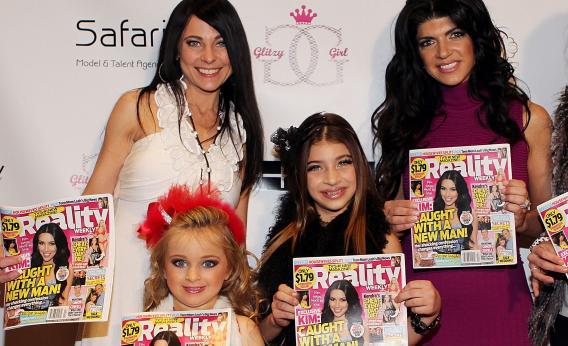Toddlers & Tiaras, always a reliable source of controversy, has grabbed headlines yet again in what may be the stupidest dustup to date. Four-year-old pageant contestant Destiny Christian, reenacting the famous scene from Grease where Sandy goes from good girl to bad, came on stage with a candy cigarette dangling from her mouth. Cue the nationwide roll-out of fainting couches. Teaching girls from the cradle that their main value in this world is their looks is one thing, but giving a child a prop that is not actually a cigarette for a dance performance? Horrors.
The excuse for all the moralizing is that letting a kid use a fake cigarette to play Sandy sends the message that cigarettes are cool. Does this mean we also have to ban Grease, or is it only toddler beauty pageants that might convince our nation’s children to take up the bad habit? I’m sure when Destiny is in high school and someone offers her a cigarette, she’ll think back to her days when she fake-smoked in the den of coolness known as child beauty pageants, and eagerly pounce on the opportunity.
Clearly, as with prior Toddlers & Tiaras scandals—including a fuss made over a mother who padded her daughter’s costume to convey the essence of Dolly Parton—the entire controversy exists to give form to our general unease over child beauty pageants. Anything where the girls mimic post-pubescent behaviors, like smoking or having giant breasts, brings another round of complaining that these pageants sexualize girls and pressure them to act like grown-ups. Of course, that criticism assumes that it’s a fine use of an adult woman’s time to enter into beauty pageants and trot around in a bikini and high heels to be judged like a cow up for auction. Once you hit adolescence, all bets are off. But the dignity of these pre-pubescent children must be preserved.
The real problem with pageants isn’t that they encourage little girls to mimic adult women. Little girls tend to do that on their own time anyway. Certainly, I must have played at being Sandy, all big hair and leather and even cigarettes, a million times as little kid. (Though does that movie have any resonance for people born decades after its release? I’m skeptical.) I suspect the main reason pageants make everyone uneasy is that they’re simply the most obvious example of how we teach girls from a young age that their sexual appeal matters more than anything else about them. To say that out loud, however, carries the implication that there might also be something wrong with putting adult women’s sexual appeal before every other quality. So instead critics of child beauty pageants stick to complaints that sound less feminist/scary. Saying smoking is bad is about as controversial as saying ice cream is good.
